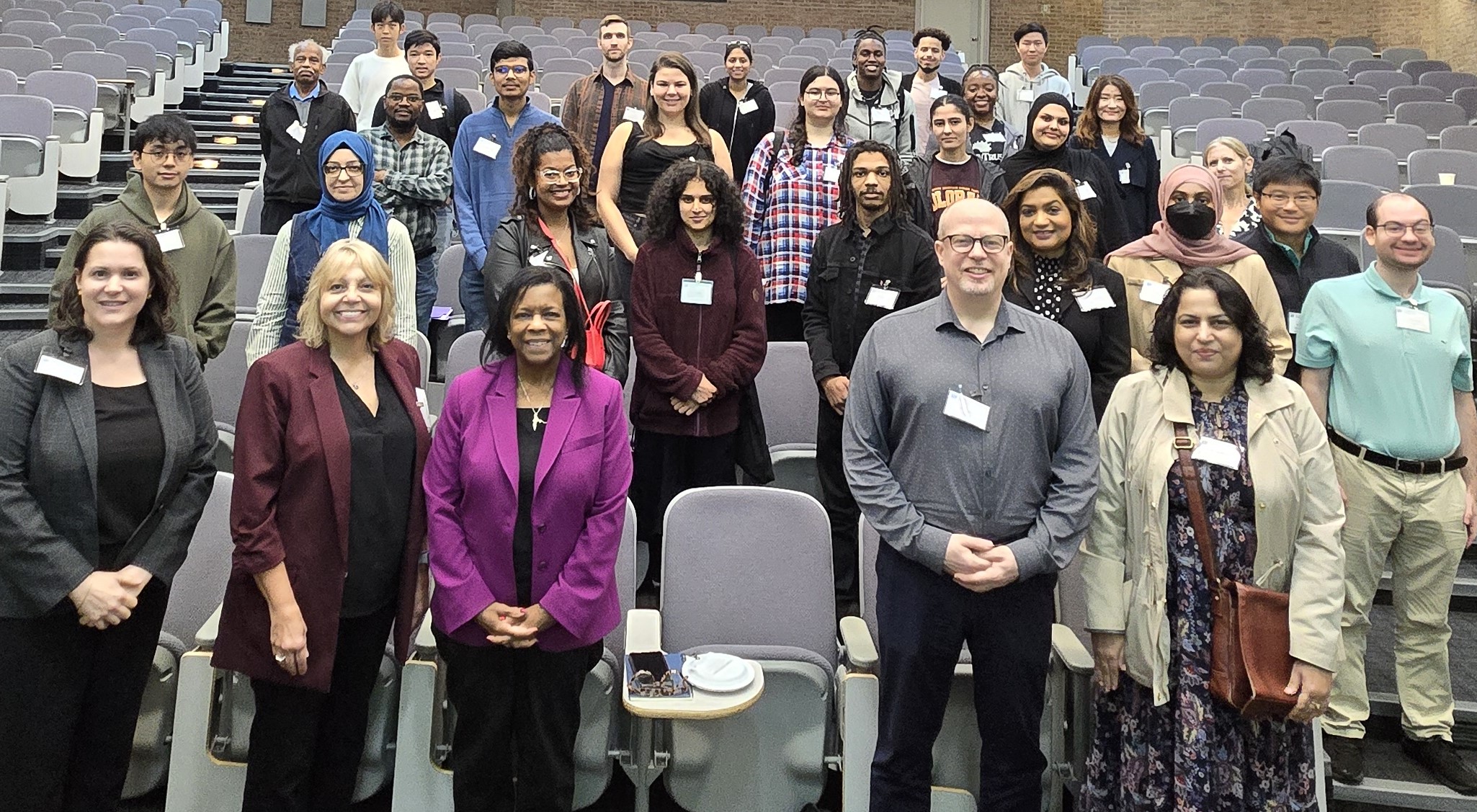The CUNY Research Scholars Program at Queensborough Community College
CRSP 2024-2025 Cohort

CRSP Orientation welcoming 2024-25 scholars and mentors.
About CRSP
The CUNY Research Scholars Program provides funding to facilitate laboratory and other research experiences for associate degree students over a one-year period. The goal of the program is to encourage undergraduate participation in authentic research and to increase persistence in STEM and Social Science disciplines.
In 2024-25, the CUNY Research Scholars Program at QCC will support 20 students and their faculty mentors.
CRSP scholars are expected to participate in the laboratory (or computer laboratory) experience for one full year and complete at least 320 hours of research/independent study. In addition to participating in research, student interns are expected to attend bi-weekly workshops on Responsible Conduct in Research, laboratory safety, research/scientific careers, presentation skills, and other professional development topics. Student interns are also expected to present a poster/talk at the college level in the fall and spring semesters.
Each year, the program culminates in a CUNY-wide symposium where students display and present their work to peers and mentors.
Student interns who do not complete the entire program and attend the program events will not qualify for the entire stipend.
Student Eligibility
Full-time associate degree students at any stage in their academic career can participate in research projects in the STEM and Social Science disciplines. Student researchers must have a minimum GPA of 2.7 and commit to being an active on-campus participant in the program at QCC for one full academic year. Additionally, they should be available to attend on-campus workshops on Wednesdays during common hour.
Program eligibility will be verified at the beginning of each semester.
Student Support
Students are awarded funding of $5,000 (paid in installments), conduct 320-400 hours of faculty-mentored research, and participate in structured activities on campus, including sessions on laboratory safety, library research, public speaking, resume development, and poster preparation.
Faculty Eligibility and Support
The program also provides compensation for faculty mentors in the amount of $1,000 per student mentee. This amount is for one full academic year of the program. Faculty are funded to mentor or co-mentor a maximum of two students. Mentors commit to meeting regularly with their student researcher, overseeing their research, and fostering the student’s interest in their academic field.
Faculty mentors (and co-mentors, if applicable) should be QCC faculty members.
Identifying CRSP Mentors/Mentees and Research Projects
Usually, prospective CRSP projects are initiated by STEM and Social Sciences faculty members, who identify and recruit promising, full-time QCC students to work on research projects with them for the academic year.
Students who would like to apply to CRSP are also encouraged to approach a QCC faculty member they know and have a positive working relationship with, and inquire about possible mentorship. CRSP faculty mentors should be QCC faculty members in STEM fields or the Social Sciences.
CRSP research projects are typically based on a faculty member's ongoing research, new research of the student's design (usually in Social Sciences), or something similar.
How to Apply
Applications for the 2024-2025 cycle of the program are now closed. We will begin accepting applications for the 2025-2026 cohort in August 2025.
For more information contact:
Dr. Regina Sullivan, Rsullivan@qcc.cuny.edu
CRSP Director for 2024-2025
CRSP 2024-2025 Scholars and Mentors
| Student Name | Research Mentor(s) | Department | Project Title |
| Afzal Khan-Narain | Celia Sporer | Social Sciences | Perceptions of Mental Health and Related Issues: How Stigma Fuels Fear and Silence Around Mental Health |
| Ashley Jaime | Monica Trujillo | Biological Sciences and Geology | Isolation and characterization of Bacteroides phages from hospital wastewater |
| Brett Hirsch | Guozhen An | Engineering Technology | Comparing MBTI-model vs Big-Five on Automatic Personality Recognition |
| Daniel Lin | Esma Yildirim | Mathematics and Computer Science | Classification of White Blood Cells using State-of-the-Art Neural Network Models |
| David Cen Cen | Dugwon Seo & Ousmane Sy Savane | Engineering Technology | Monitoring water quality parameters of water from internal plumbing systems by season and water consumption demand |
| David Eun Sung Lee | Sunil Dehipawala | Physics | Comparison of Zinc in variety of plants using synchrotron X ray absorption |
| Gilsy Perez | Patrick Byers | Social Sciences | The Collective Construction of the Realities of Mental Health in Everyday Discourse |
| Ieesha Ansar | Sharon Lall-Ramnarine | Chemistry | Synthesis and properties of hydroxyl-functionalized imidazolium ionic liquids |
| Iman Zahid | Yusuf Danisman | Mathematics and Computer Science | Backtesting-Driven Modeling for Predicting Stock Market Trends |
| Jacqulyn Persaud | Andrew Nguyen & Sarbani Ghoshal | Biological Sciences and Geology | Identification of organic compounds in tea extract inhibiting macrophage production of proinflammatory cytokines |
| Jalen Nicolas | David Sarno | Chemistry | Polyaniline and its derivatives for the removal of metal ions from aqueous solution |
| Jinzhi Chen | Sharon Lall-Ramnarine | Chemistry | Optimizing Ionic Liquid Properties for Li-Metal Battery Electrolytes |
| MD Rashedul Islam | Rex Taibu | Physics | Attenuation of Beta and Gamma Radiation by a Commercial Bolus Material: A Comparative Study with Locally Available Alternatives |
| Megan Wuerz | Rondi Davies | Biological Sciences and Geology | Characteristics of microdiamonds from the Central Slave Craton Canada |
| Mekahla Simpson | Michelle Rossi | Nursing | Is there a heightened prevalence of Diabetic Ketoacidosis in poorer socioeconomic background? |
| Nayla Walters | Michelle Rossi | Nursing | Uncontrolled glucose and its role in DKA (diabetic ketoacidosis) and organ failure in type 2 diabetes |
| Sabina Ruzieva | Yusuf Danisman | Mathematics and Computer Science | Evaluating Stock Market Trends Using Various Model Evaluation Techniques |
| Sana Naseri | Jody Resko | Social Sciences | Engagement in prayer: How it helps cope with stress |
| Win Yuya Khin | Sasan Karimi | Chemistry | Synthesis of Several Potentially Isolable Atropisomeric Benzazepines |



